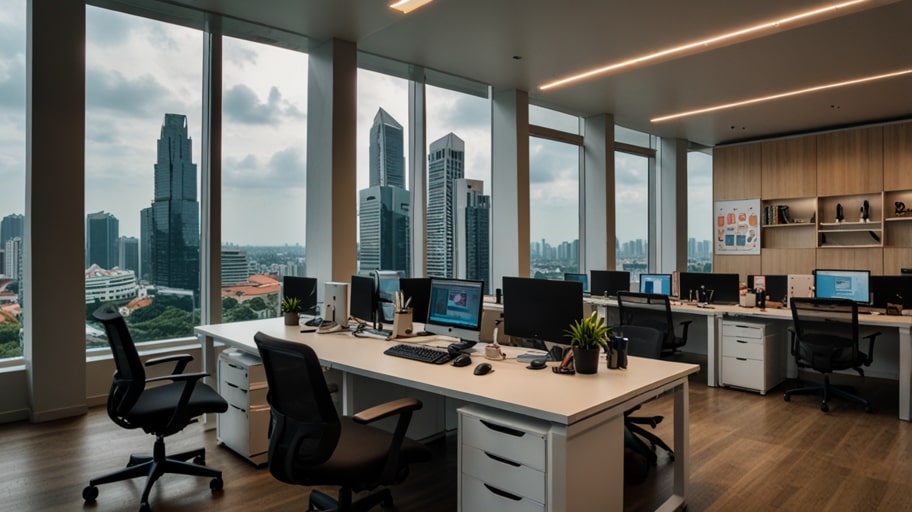Singapore has become a very attractive entrepreneurial place in Asia, thus converting the city-state into the continent’s main hub in technological innovation. New technologies in the field of finance, bio and innovative urban solutions are quickly gaining ground as a result of government initiatives and the well-chosen location.
Governmental policies play a very catalytic role in the rapid development of this industry. Reduction in tax rates, the availability of grants, and an uncomplicated regulatory environment are the driving forces behind many ambitions.
Startups are given guidance, while access to finance and skills are made available through these incubators and accelerators. The local market is covered well enough by this mixed setup, while the rapid growth in international competitiveness is still allowed.
The most significant upstart sector is Fintech. Singapore IT companies have become very famous with Fintech startups pioneering novel digital payment systems as well as the use of blockchain.
A startup has brought to market a cost-effective and user-friendly system for doing cross-national transactions. This innovation will especially be a huge relief for businesses and consumers, reducing concerns of the long lines of customers by 50%, and has gained followers all across Southeast Asia.
Moreover, the Bio sector has been attracting a lot of attention lately. What entrepreneurs are doing is creating new therapies to treat tropical diseases by exploiting the advanced research facilities in Singapore.
Via the e-commerce channel, a start-up that focuses on the gene-editing treatment of dengue has raised a significantly large amount of funds to ensure that it is made possible to deliver new treatments in the future. This is in line with the city’s innovation drive in healthcare, bolstered by the substantial increase in regional demand.
There is a great momentum in the Smart city domain. Implementing AI and IoT is the trend in urban developments. This expansion plan has even attracted investors with a sensor-based system that effectively lowers the energy load of the buildings.
They have even won the trust of the municipal authorities in the process. These successful startups are fully consonant with the vision of Singapore, looking forward to the possibilities of environmentally friendly and tech-savvy urban transformations.
Singapore’s diverse talent pool plays a crucial role in the development of the startup scene. Professionals from overseas and local graduates are cooperating and working together, which causes them to bring differing points of view to the venture.
Targeting the security of smart devices, the latest creation by a team of young engineers served to solve the problem of the increasing number of attacks. The project was also able to withstand a comprehensive encryption and has an interface that is user-friendly, attracting the attention of the public.
The world of venture capital is highly enthusiastic about Singapore and eager to invest there. The AI and robotics startups are especially favored, for example a firm involved in the autonomous delivery system business attracted many financiers. The capital only becomes a direct innovation trigger, thus supporting those entrepreneurs aspiring to convert their business ideas into real and tangible products.
It is an undeniable fact that the Lion City has some inextricable connections with emerging problems such as the talent competition and the operational costs that are taking large values. The progress of most of these young companies comes from bootstrapping strategies, where either private funds are ploughed back into their business or grants are given.
Nevertheless, Singapore’s diminutive nature of prosperity makes their start-ups a close-knit community, in which entrepreneurs are able to share each other’s resources and ideas, thus lessening the difficulty, not to mention that the growth is being sustained from ground level to world-beaters.
Another significant player in the market is the gig economy. We see that the long strides through which platform companies hire freelancers have been made possible, and they have access to a pool of available talent. The platforms they are signing up for to get the latest freelance jobs and projects are the ones through which they are having their fair compensation and flexibility in meeting job offers.
These new businesses are meant to serve a versatile workforce that is in continual pursuit of autonomy, thus reflecting a unique character of the Singaporean way to adapt to these changing times while still holding onto their economic stability, globally speaking.
There are a lot of startups that have sustainability at their heart while they are at capacity. Many of the startup businesses are on the frontier of the issue of eco-friendly packaging and were the first to bring renewable energy into the market.
One firm, for instance, has introduced its range of biodegradable materials and reduced the public’s use of plastic, leaving a good impression on the green community. These projects are in harmony with the sustainability aims pursued by Singapore, and such practices now make it the world leader in green energy and ethics.
Edtech is currently in a growing phase with learning platforms that use artificial intelligence to offer students question-driven education. The aforementioned enterprises are the ones that are bringing the courses to the market at a fraction of the cost and with high levels of customization in the coding and financial sectors, and for people who are either already working in the industry or are students.
Such businesses, through the provision of the “pretty much for everyone” education, are addressing the key skills shortage in the market that is keeping pace with rapidly changing employment situations, as the job market is experiencing. Thus, the chances of getting employed are maximized.
Singapore companies strive to go beyond their local markets and to land partnerships in Asia and other continents. Initially a logistics tech company, it has recently become a global business that is changing supply chain management with AI in Europe. This international expansion is a perfect indication that Singapore can produce and export innovative technology, and it is also capable of complying with the different regulatory systems that exist in the world.
It’s always a case of failure as a stepping stone. Entrepreneurs go through change as they transition after setbacks, and in the process, their ideas are reshaped through iterations. Such an environment of endurance fosters an experimentation culture where only the brave can undertake risks sufficient enough to produce breakthroughs. The same atmosphere in Singapore further steels this spirit as it makes sure that the startups’ initiators can pull themselves back up and go back to their old and new innovation modes.
Huge corporate names have strengthened the support ecosystem with mentorship and the assurance of acquisitions. Take the case of a little AI startup that got acquired by a big technology giant and consequently witnessed its client base growing, and yet managed to stick to its innovative way of doing things. These are the joint ventures that allow the agility of startups to meet the scale of corporate operations, thus the result of the union is the mutual prosperity of both parties.
The emergence of new customer behaviors has opened the door to lots of exciting startups. Companies operating in the sectors of telemedicine and e-commerce not only survived but blossomed during these times, exemplifying how businesses can match society’s demands.
The startups are not only very well accepted by the market, but they also will bring the sectors and the country into a new era full of disruptive moments that will, in essence, be the main factors for the success of the new era and the new situation of the post-pandemic recovery.
In the wake of national turmoil, Singapore has packed its suitcase and is in a hurry to make its mark in the Asia region as the “innovation powerhouse.” The brave new startups have ventured to merge technology with eco-friendly products in the hope of leading the country through entrepreneurship. The success of these ventures is certain to set Singapore as a trendsetter in the world market for possibly many years to come.




